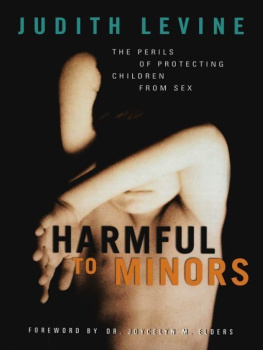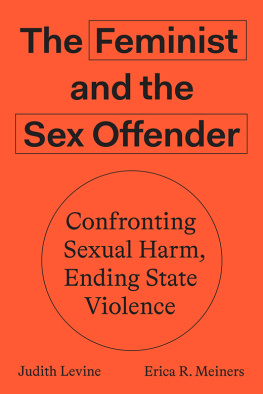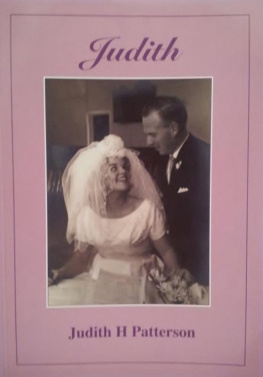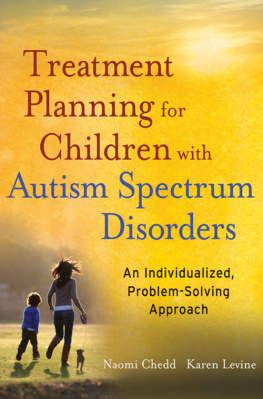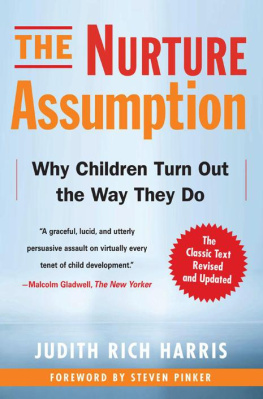Table of Contents
Passage from Weetzie Bat text copyright 1989 Francesca Lia Block; used by permission of HarperCollins Publishing. Brown Penny, by W. B. Yeats, from The Collected Works of W. B. Yeats, Volume 1: The Poems, Revised, edited by Richard J. Finneran (New York: Scribner, 1997); reprinted with permission of Scribner, a division of Simon & Schuster, Inc. Fragment from Sappbo: A New Translation, by Mary Barnard (Berkeley: University of California Press, 1958); copyright 1958 by the Regents of the University of California, renewed 1986 by Mary Barnard; used by permission of the University of California Press.
Copyright 2002 by Judith Levine
All rights reserved. No part of this publication may be reproduced, stored in a retrieval system, or transmitted, in any form or by any means, electronic, mechanical, photocopying, recording, or otherwise, without the prior written permission of the publisher.
Published by the University of Minnesota Press
111 Third Avenue South, Suite 290
Minneapolis, MN 55401-2520
http://www.upress.umn.edu
Library of Congress Cataloging-in-Publication Data
Levine, Judith, 1952Harmful to minors : the perils of protecting children from sex / Judith
Levine ; foreword by Joycelyn Elders. p. cm.
Includes index.
ISBN 978-1-452-92157-0 (alk. paper)
1. Sex instructionUnited States. I. Title.
HQ56 .L3255 2002
306.70973dc21
2001006553
Printed in the United States of America on acid-free paper
The University of Minnesota is an equal-opportunity educator and employer.
12 11 10 09 08 07 06 05 04 03 02 10 9 8 7 6 5 4 3 2
To Paul
Foreword
Dr. Joycelyn M. Elders
In America we are in the midst of a sexual crisis. We lead the Western world in virtually every sexual problem: teenage pregnancy, abortion, rape, incest, child abuse, sexually transmitted disease, HIV/AIDS, and many more.
Ironically, for someone who has come to be closely associated with forthrightness about sexuality, I was raised in an environment in which sex was never discussed. During my life I have moved from complete, community-imposed silence about sex to dealing professionally almost every day with some of the toughest issues about sexuality. I know firsthand what it was like to be ignorant, and I also know how vital it is to be informed. I have talked with parents who have just learned that their newborn baby was born with sexually ambiguous genitals and with parents whose child isnt advancing toward puberty. I have spent large parts of my professional life trying to educate people and develop social policies to address problems that are eating away at the very fabric of our societyteenage pregnancy and its frequent result, inescapable poverty, ignorance and enslavement, HIV, AIDS, and other sexually transmitted diseases. The day-in, day-out nature of this work leads me to be impatient with people who object to Surgeons General, teachers, parents, and others advocating the use of condoms, for instance. As Ira Reiss states so eloquently in his book Solving Americas Sexual Crisis, the vows of abstinence break far more easily than do latex condoms. Hysteria about sex has hindered attempts to address these pressing concerns, and the people hurt most are those who most need the informationour young people, the poor, and the uninformed. Ignorance is not bliss.
All of this makes Harmful to Minors such a vitally important book, one that brings an essential new perspective to this crucial set of issues. Drawing together stories in the media (as well as those that are less known), interviews with young people and their parents, and astute analysis, Judith Levine passionately argues for honesty and forthrightness in talking to children about sex. She lays bare the conservative political agenda that underlies many supposed child protection efforts. Perhaps what is most valuable about this book is the way it outlines the dominant, and often hidden, fact of discussions about sexuality in this country: the influence of the religious right (or what I have been known to call the very religious non-Christian right). I have spoken and written many times about my disgust with people who have a love affair with the fetus but wont take care of children once they are born. Harmful to Minors not only makes explicit the crucial importance of frank and accurate information about sexuality being widely available to people of all ages, it lays out a sensible, positive, and possible program to do so.
Treating sex as dangerous is dangerous in itself. We need to be matter-of-fact about what is, after all, a fact of life. Judith Levine argues convincingly that there is an intimate connection between the values we display in our sexual lives and the values we display as a society. She is rightsex is a moral issue, but not in the way the Christian right claims. Children must be taught sexual ethics and responsibility, inside and outside the home, just as they are taught how to behave in any number of public and private arenas. Teaching children to have self-respect, to feel good about themselves, to make good decisions: to me, that is sexuality education.
Authors Note
Most of the research for this book, including interviews, was conducted between 1996 and early 2000, and pertinent statistics were updated in 2001. The names of all nonprofessionals have been fictionalized, along with some identifying characteristics.
Acknowledgments
Among the most pleasurable tasks of writing a book is thanking the people who helped you. Of course, that includes everyone who has fed you a meal, suggested an idea, or cheered you up when the going got rough, during all the years you worked on the project. Because this books going was frequently rough and the years were many, I was the recipient of many meals and many ideasand an inordinate amount of much-needed cheering. So I begin by asking forgiveness from those I have not named; and to those I have, I extend the usual disclaimer: you are held harmless in any breach, infringement, violation, or stupidity herein committed.
Thanks to my writers groupAllan Brub, Jeffrey Escoffier, Amber Hollibaugh, Jonathan Ned Katz, and Carole Vancefor their monthly infusions of loyalty, wisdom, and pasta. Members of the group, as well as Bill Finnegan, James Kincaid, Harry Maurer, Vanalyne Green, Peggy Brick, Leonore Tiefer, and Sharon Lamb read all or part of the manuscript (sometimes more than once!) and commented with acuity and generosity. At Mother Jones, Sarah Pollock provided excellent and endlessly patient editorial guidance to what is now chapter 3, and Jeanne Brokaw saved my skin with her meticulous fact-checking. Steve Fraser first acquired this book when others shied away and gave it learned and encouraging editorial guidance before he left commercial publishing. The industry is much diminished by the loss of his erudition, seriousness, and courage. I feel fortunate to have ended up with Carrie Mullen at the University of Minnesota Press, who has proven her commitment to unpopular ideas and her enthusiasm for scholarship without disciplinary borders. Great thanks too to the presss outside readers, who put their fingers directly on the books weaknesses. Where Ive cooperated, they greatly improved my arguments.
For much of its writing this book has felt like a battle. As time passed, both the political and commercial climate seemed to grow more hostile to its ideasand, more important, to childrens sexual happinessand that has often rendered me lonely and discouraged. Those who stand by the ideals to which the book is committed, therefore, have risen even higher in my esteem. In my closest circle, Debbie Nathan, Bob Chatelle, and Jim DEntremont earn my admiration for continuing to labor on behalf of those unjustly accused during the child abuse panics, when almost everyone else has forgotten them. Leanne Katz, the late executive director of the National Coalition Against Censorship, was prescient in recognizing the cultural calamity inherent in censoring sex and was never afraid to put herself on the line for all varieties of human expression. Her successor, Joan Bertin, is doing an impressive job filling her shoes. Among sex therapists, Leonore Tiefer doesnt always win friends, but she always influences the people in her profession and elsewhere with her tough, sane, pro-sex, antisexist thinking and activism.


